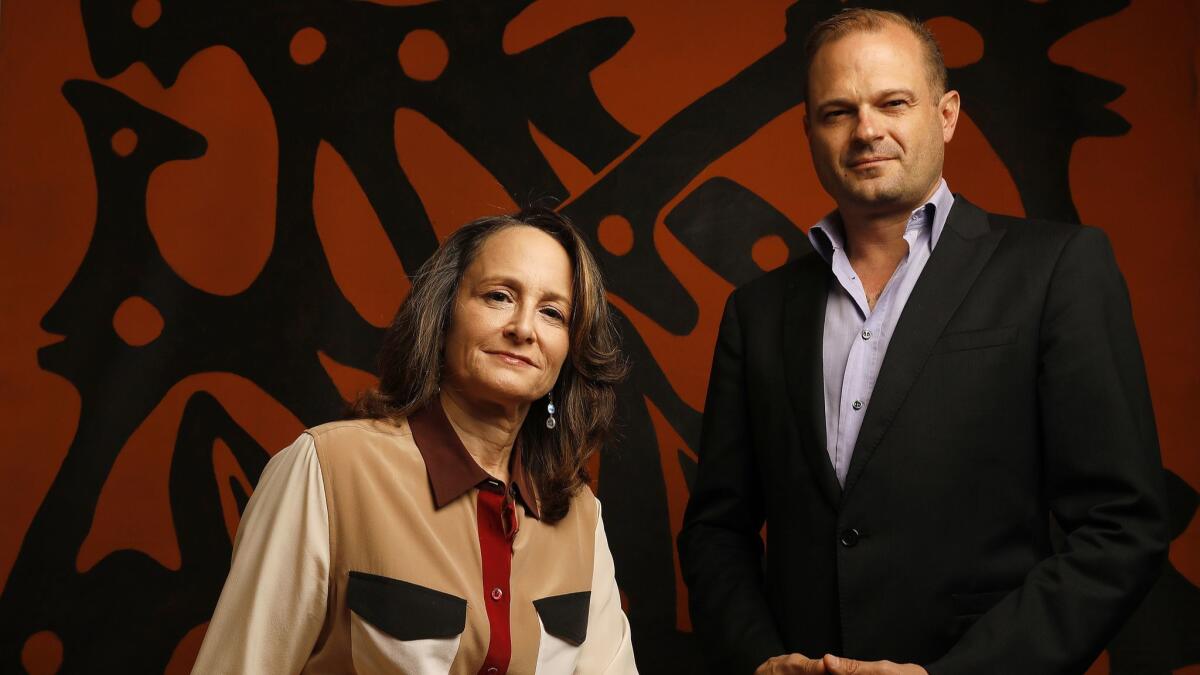How Nina Jacobson’s team behind ‘Crazy Rich Asians’ and ‘Hunger Games’ became a force in Hollywood

- Share via
In summer 2016, movie producer Nina Jacobson accompanied her 16-year-old daughter on a visit to her alma mater, Brown University, and the memories came flooding back.
Walking along the green lawns and Gothic buildings of the Providence, R.I. campus, Jacobson recalled her first two years of college when she struggled with the fact that she was gay.
“I realized so much of my college years were spent not wanting to be gay,” she said. “I just imagined how different it would be if I were going through that experience in 2016 as opposed to 1984.”
Jacobson drew upon those memories when she was developing scripts for FX’s “The Assassination of Gianni Versace: American Crime Story,” about the killer who murdered the flamboyant fashion designer. She knew that taking audiences back to the homophobia of decades past would make the story powerful for contemporary viewers.
An instinct for finding the personal relevance in stories has served Jacobson well since her career as a top studio executive came to an abrupt end 12 years ago, when Walt Disney Co. fired her. Since then, Jacobson, 53, has made a remarkable comeback. The hard-charging executive and her producing partner Brad Simpson, 45, make up one of the most successful filmmaking teams working today.
Their nine-person Los Angeles production company, Color Force, has been riding high with a string of hit franchises, such as “The Hunger Games,” “Diary of a Wimpy Kid” and the recent summer smash “Crazy Rich Asians.” The four “Hunger Games” movies alone grossed nearly $3 billion globally.

When you’re the one getting up at four in the morning, you actually just have to love it. You can’t just guess what other people will like.
— Nina Jacobson
The pair recently joined Ryan Murphy onstage as he accepted the outstanding limited series Emmy for “Gianni Versace,” the second time the “American Crime Story” franchise earned the award.
Many axed studio bosses have struggled to transition to producing. The movie business has become increasingly challenging for producers as studios bet on time-tested franchises rather than new intellectual property.
But Jacobson has thrived by embracing the old-school method of using popular books to attract top-shelf directors and actors. She and Simpson are voracious readers who gravitate toward books that they term “literary pulp,” or stories with more depth than the typical beach read. Jacobson, in particular, has a knack for navigating the studio system and working with authors and writers, skills she honed as an executive at Disney and other studios.
“They have really good taste,” said John Landgraf, Chief Executive of FX, where Color Force has an exclusive TV production deal. “I honestly think they’re early in the curve of their success.”
Now they’re wrapping up an ambitious adaptation of the 784-page Donna Tartt novel “The Goldfinch,” which won a Pulitzer prize for fiction. Also in the works is a series adaptation of the sci-fi graphic novel “Y: The Last Man.”
“I’ve never adapted a book I didn’t love,” Jacobson said in an interview, seated in Color Force’s one-story Sawtelle office. “When you’re the one getting up at four in the morning, you actually just have to love it. You can’t just guess what other people will like.”
‘Crazy Rich Asians’
Mostly, their bets have proved lucrative.
Their latest hit “Crazy Rich Asians,” based on the Kevin Kwan novel and featuring an all-Asian cast, became one of the biggest break-outs of the summer, at a time when studio-backed romantic comedies are nearly extinct. The $30-million film, released by Warner Bros., has grossed more than $200 million.
Color Force sought the rights to “Crazy Rich Asians” after reading the book around the time of its publication in 2013.
Kwan was hesitant to turn over his work to Hollywood after hearing horror stories from fellow authors. He spent hours in a United Talent Agency conference room in Beverly Hills, listening to pitches from other producers who, it seemed, hadn’t read the book. The Color Force duo won him over, quoting lines from the novel. Jacobson said she believed mainstream audiences would identify with Rachel Chu’s experience trying to deal with the disapproval of her boyfriend’s mother.
Kwan knew Jacobson and Simpson had a track record with writers.
“They were known for actually making book adaptations happen,” Kwan said.
The producers partnered with financier and production company Ivanhoe Pictures to develop the movie outside the studio system, believing they could protect Kwan’s vision.
During a scouting trip to Singapore, Jacobson spoke to an Oxford-educated woman at a well-known restaurant who explained why the worst person to bring home to her parents would be a white American man.
“She said, ‘Our families understand duty, longevity and permanence, and Americans can never understand the responsibility of stepping into a family like ours,’” Jacobson recalled. “And we incorporated that into the material.”
‘Who ever told you to be honest?’
Jacobson, who was born in Los Angeles, brings an insider’s knowledge of the studio system. After graduating from Brown, she worked various entertainment industry jobs, including a stint at producer Joel Silver’s Silver Pictures.
Later, as an executive at DreamWorks SKG, she shepherded movies such as “Antz.” She remembers Jeffrey Katzenberg advising her to think of the film not as a kids’ picture but rather as something that could appeal to grownups. She spent years leading Walt Disney Motion Pictures Group, where she oversaw such films as “Remember the Titans.”
She founded Color Force in 2007, the year after she was ousted by Disney amid a broader restructuring of the studio. The dismissal came as a surprise to many, coming on the heels of a hit “Pirates of the Caribbean” sequel.
She first worked with Simpson after a DreamWorks executive paired them on a movie, which eventually fell apart because of the 2007 writers’ strike.
“She understands the pressure that studio executives are under,” Simpson said. “She speaks with authority when she talks to a head of distribution. She’s given notes on marketing campaigns. Most independent producers just don’t have that insight.”
Executives declined to disclose financials but said Color Force’s business was expanding.
If you’re not working with someone with conviction, what are they doing there?
— John Landgraf, Chief Executive of FX
Jacobson is known for unapologetic forthrightness, and sometimes risks bruising fragile Hollywood egos. At Disney, she famously clashed with M. Night Shyamalan when she shared her unvarnished feelings about the script for “Lady in the Water.” Shyamalan took the movie to Warner Bros., and it bombed.
As a producer, she once had to tell a talent manager why the studio wasn’t considering a certain actor for a movie role. The studio, she explained, was interested in someone else. Soon after the conversation, she got a call from an irate studio executive.
“He said, ‘Who ever told you to be honest?’” Jacobson recalls. “I don’t know. It’s a default.”
That trait sometimes leads her to butt heads with executives like FX’s Landgraf.
“I wouldn’t have it any other way,” Landgraf said. “If you’re not working with someone with conviction, what are they doing there?”
One of their key earlier hits was “Diary of a Wimpy Kid.” Writer Jeff Kinney harbored concerns about what a studio would do to his books’ quirky characters. But Jacobson convinced him she would stay true to the material. The first “Wimpy Kid” movie was a sleeper hit for Fox in 2010, and spawned three sequels.
“One of the reasons she’s such a successful person and producer is because she’s very empathetic,” said Fox 2000 President Elizabeth Gabler. “She wears her heart on her sleeve, which is something that in this business can be hard for her, but that’s why talent loves working with her.”
During a writers room meeting for “The People v. O.J. Simpson: American Crime Story,” screenwriter Joe Robert Cole noticed that Jacobson was playing a game on her phone while they were debating how to solve a roadblock in the script. Suddenly, she looked up and suggested a key fix for the episode.
“She’d absorbed everything,” Cole said. “That, to me, is the crux of someone who’s seen it all, and who knows what she’s doing.”
‘Our movie has gone down’
Not everything has gone according to plan. In January, Simpson woke up from a two-hour in-flight nap and sent Jacobson a text to ask if he’d missed anything.
He had. The famous heiress Patty Hearst had just released a statement blasting the Jeffrey Toobin book that they had planned to make into a movie about her kidnapping. Fox had decided to shelve the film.
“ ‘While you were flying our movie has gone down,’ ” she texted him.
When not working, Jacobson, an animal lover with two Australian shepherds, spends time horseback riding in Malibu. She bought a horse when she was 39, using $10,000 her grandfather had bequeathed to her.
She doesn’t miss the life of a studio executive, which has changed dramatically since she left Disney.
“I think a lot of what I loved being a studio executive was the variety and freedom,” she said. “But now as a producer, you’re much more able to enjoy those two things. What I loved about it doesn’t necessarily exist anymore.”
More to Read
Inside the business of entertainment
The Wide Shot brings you news, analysis and insights on everything from streaming wars to production — and what it all means for the future.
You may occasionally receive promotional content from the Los Angeles Times.











